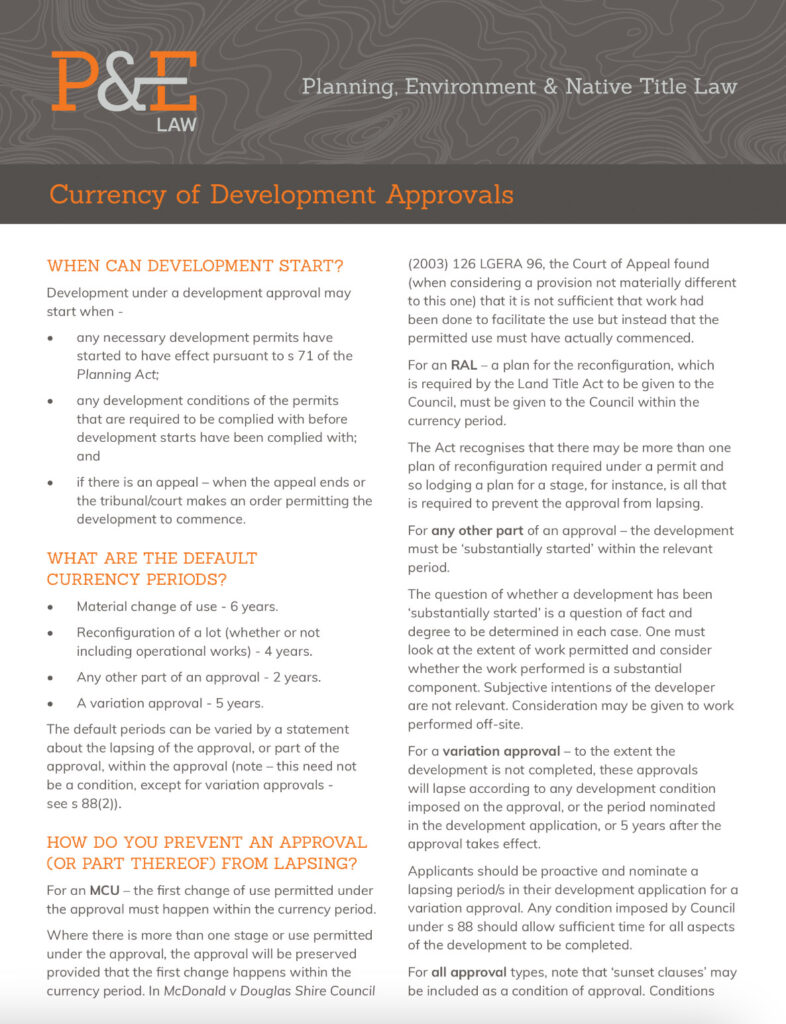Currency of Development Approvals : Cheat Sheet
This cheat sheet provides quick tips on what you need to know about the Currency of Development Approvals.
Click here to download the PDF cheat sheet. [October 2021]
WHEN CAN DEVELOPMENT START?
Development under a development approval may start when –
- any necessary development permits have started to have effect pursuant to s 71 of the Planning Act;
- any development conditions of the permits that are required to be complied with before development starts have been complied with; and
- if there is an appeal – when the appeal ends or the tribunal/court makes an order permitting the development to commence.
WHAT ARE THE DEFAULT CURRENCY PERIODS?
- Material change of use – 6 years.
- Reconfiguration of a lot (whether or not including operational works) – 4 years.
- Any other part of an approval – 2 years.
- A variation approval – 5 years.
The default periods can be varied by a statement about the lapsing of the approval, or part of the approval, within the approval (note – this need not
be a condition, except for variation approvals –
see s 88(2)).
HOW DO YOU PREVENT AN APPROVAL (OR PART THEREOF) FROM LAPSING?
For an MCU – the first change of use permitted under the approval must happen within the currency period.
Where there is more than one stage or use permitted under the approval, the approval will be preserved provided that the first change happens within the currency period. In McDonald v Douglas Shire Council (2003) 126 LGERA 96, the Court of Appeal found (when considering a provision not materially different to this one) that it is not sufficient that work had been done to facilitate the use but instead that the permitted use must have actually commenced.
For an RAL – a plan for the reconfiguration, which is required by the Land Title Act to be given to the Council, must be given to the Council within the currency period.
The Act recognises that there may be more than one plan of reconfiguration required under a permit and so lodging a plan for a stage, for instance, is all that is required to prevent the approval from lapsing.
For any other part of an approval – the development must be ‘substantially started’ within the relevant period.
The question of whether a development has been ‘substantially started’ is a question of fact and degree to be determined in each case. One must look at the extent of work permitted and consider whether the work performed is a substantial component. Subjective intentions of the developer are not relevant. Consideration may be given to work performed off-site.
For a variation approval – to the extent the development is not completed, these approvals will lapse according to any development condition imposed on the approval, or the period nominated in the development application, or 5 years after the approval takes effect.
Applicants should be proactive and nominate a lapsing period/s in their development application for a variation approval. Any condition imposed by Council under s 88 should allow sufficient time for all aspects of the development to be completed.
For all approval types, note that ‘sunset clauses’ may be included as a condition of approval. Conditions of that kind will cause an approval to lapse on the nominated day, irrespective of the default position described above. Those conditions can be changed by making a change application (which might be coupled with an extension application).
CAN I APPLY TO EXTEND THE CURRENCY OF MY APPROVAL?
An application to extend a currency period of a development must be made before the approval lapses (an extension application). The application must be made in the approved form and must be accompanied by the required fee and written consent where the applicant is not the owner of the premises.
When assessing an extension application, the Assessment Manager may consider any matter that the Assessment Manager considers relevant, even if the matter was not relevant to assessing the development application.
The scope of that assessment has been considered by the P&E Court twice.
In Room2Move v Western Downs Regional Council, Williamson QC DCJ regarded it as relevant, to the exercise of discretion, whether there is a “town planning imperative” for the development and its approval to be the subject of a fresh assessment and decision.
In Sevmere Pty Ltd v Cairns Regional Council his Honour Judge Rackemann preferred the use of the words “good town planning reason” rather than “imperative” to reflect the “strength that this consideration needs to achieve in order to justify a refusal of an extension application”.
In an extension application, it will be necessary to consider whether there is a ‘good town planning reason’, in its broadest sense. This might include consideration of:
- any changes to the applicable town planning provisions since the approval was granted, and whether the development is consistent with the current provisions;
- any changes to the applicable town planning process that would apply to an application for the development if it was to be made now. For instance, whether the level of assessment, involvement of public notification, etc has changed, and to what effect;
- any changes to relevant facts and circumstances which might affect the development’s compliance with current planning intent;
- steps taken by the applicant to progress the development, including how advanced the development is;
- the justification for the length of extension sought – is it required to complete the development imminently or is it sought to ‘warehouse’ the approval.
Note that, unlike development applications, it is permissible (and appropriate in the context of the matters described above) to consider the personal circumstances of the applicant.
All references to legislation are references to the Planning Act 2016 as at 13 October 2021.
This is general advice only. Specific advice should be sought in each instance.
Individual liability limited by a scheme approved under professional standards legislation
© 2021
